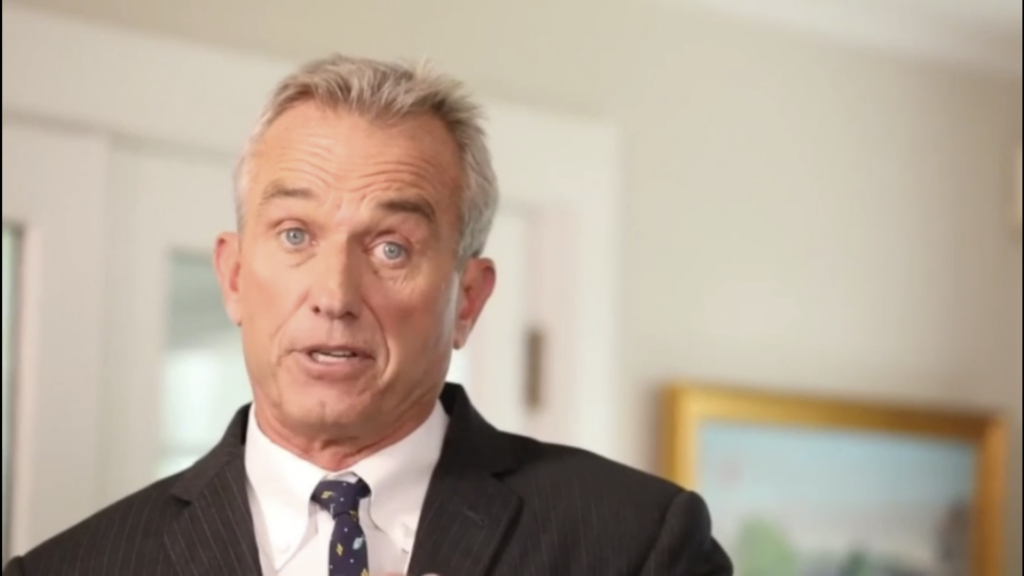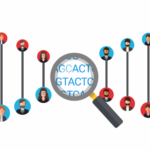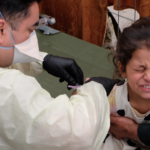Experts: How RFK Jr. could undermine support for vaccines if Trump wins
By Matt Field | November 1, 2024
 A screenshot of a video featuring Robert F. Kennedy, Jr. on Children's Health Defense's website. Credit: Children's Health Defense.
A screenshot of a video featuring Robert F. Kennedy, Jr. on Children's Health Defense's website. Credit: Children's Health Defense.
Robert F. Kennedy Jr., a man practically synonymous with anti-vaccine views, in charge of public health decisions in Washington? Donald Trump’s campaign has taken to touting a role for the one-time presidential candidate with a famous name should Trump win, saying, as Trump put it, that Kennedy could “go wild” on the issues of health and medicine in his administration.
It’s a scary thought to many health experts–vaccines being one of public health’s primary tools in combatting infectious diseases. In the past 50 years, according to the World Health Organization (WHO), vaccines have saved 154 million lives. Kennedy has said that under a Trump administration, he would be tasked with addressing what he calls an epidemic of chronic diseases, and his record suggests that he sees vaccines as a primary culprit. “The vaccine industry and the cartel has done an extraordinary job of kind of disabling all of the institutions in a democratic society that are intended to protect little children from greedy corporations,” Kennedy said in a video on the website of his nonprofit Children’s Health Defense. “They have turned the regulatory agencies, FDA, HHS, and CDC into sock puppets.”
Numerous studies have found vaccines approved by the US government to be safe.
It’s unclear exactly what position Kennedy would fill should Trump return to the White House, but some experts worry about putting Kennedy anywhere near the vaccine policymaking machinery of federal health agencies, two of the most important parts of which being the advisory committees to the Food and Drug Administration (FDA), where the Vaccines and Related Biological Products Advisory Committee (VRBPAC) makes recommendations on whether to approve vaccines, and the Centers for Disease Control and Prevention (CDC), where the Advisory Committee on Immunization Practices (ACIP) recommends vaccines for use, determinations that states rely on to set their own school vaccine requirements.
Kennedy has previously characterized the committees as rife with conflicts of interest and deep ties to the pharmaceutical industry. A video featuring Kennedy on Children’s Health Defense’s website titled The Vaccine Safety Project includes a lengthy critique of the FDA and CDC committees. The CDC committee involves pharmaceutical company insiders creating billions of dollars in profit for vaccine makers without rigorous scientific backing, Kennedy alleges in the video. As evidence, he relies on what he says is a 2000 US House committee report citing conflicts of interest among the members of the two federal health committees.
Kennedy echoed these themes in a recent town hall where he said he would end alleged corruption and conflicts of interest in health agencies and return them to “gold standard, empirically based, evidence-based science” and “end the chronic disease epidemic in this country.”
Paul Offit, a vaccine expert at the Children’s Hospital of Philadelphia, was on the CDC advisory committee in the early 2000s; he now sits on the FDA committee in charge of vaccine approval recommendations. Offit vehemently disagrees with Kennedy’s assessment that vaccine policy is being made by conflicted people and without adherence to rigorous science. At the FDA, he said, members fill out “lengthy forms” for every meeting to show they do not have any ties to companies being discussed.
And as for the scientific rigor of vaccine research, Offit said, “[Kennedy] continues to say that the measles, mumps, rubella vaccine causes autism, even though there are 18 studies that have been done over the past couple decades in seven countries, on three continents, involving thousands and thousands of children, that probably cost hundreds of millions of dollars, to show that you are no more likely to get autism if you’ve been vaccinated or you haven’t. But still, he says, [the measles, mumps, and rubella] vaccine causes autism.”
Kennedy, Offit said, believes in conspiracy theories connecting the pharmaceutical industry, the government, and the medical establishment. “He’s going to look behind the curtain and show this massive international conspiracy to basically harm the public’s health in the interest of money—which doesn’t exist. The conspiracy that he thinks is around doesn’t exist.”
The Trump campaign has been coy about the specifics of a potential Kennedy role. “The only thing President Trump and his campaign team are focused on is winning on November 5th. Everything after that is after that, and President Trump has made clear that Bobby Kennedy will play an important role,” Jason Miller, a senior advisor to Trump’s campaign, said in a statement to the Bulletin.
Kennedy, who has been campaigning for Trump, has said he was promised “control of the public health agencies.” Campaigning in swing state Nevada on Thursday, Trump said Kennedy would work on “health and women’s health.” People familiar with planning for a potential Kennedy role said he would be in charge of an “all of government project” that grants Kennedy resources from all the agencies that deal with childhood chronic disease, according to NBC News.
Meanwhile, a leader of the team preparing for a potential Trump presidency said Kennedy wouldn’t get a top agency job. Howard Lutnick, a campaign transition official, told CNN that what Kennedy wants is vaccine data with which to assess vaccine safety.
Dorit Reiss, who researches vaccine law and policy at the University of California College of Law, San Francisco, worries about Kennedy having the ability to shape how government data is presented. She fears he will use data access to create flawed and biased reports on vaccines, ones that will come with the imprimatur of the federal government. “He believes what he wants to believe, and he doesn’t care about the data,” she said.
Reiss thinks Kennedy would face obstacles if he were put in a position to influence federal vaccine policy. States rely on the CDC advisory committee as the basis for their own vaccine policies because they consider it to produce expert advice. In theory, an empowered Kennedy might be able to influence who is on that committee, but if that leads to a less credible committee, states will simply ignore its recommendations. Fill the committee with people like discredited former UK doctor Andrew Wakefield, who produced a now retracted study that linked vaccines to autism, and it will not have the prestige it currently enjoys, Reiss said.
But the committee does have a few direct levers to pull on vaccines, Reiss said. The CDC advisory committee also makes recommendations, that if approved by the CDC director, determine which vaccines insurers participating in the Affordable Care Act’s marketplace must cover. The committee also makes recommendations about which vaccines to provide under a CDC program to provide recommended vaccines to low-income children.
In an age when Republican support for school vaccination requirements is slipping, when the top health official in Florida decided to eschew standard procedures for containing a measles outbreak at a school and let parents decide whether to send unvaccinated children to school, and when anti-vaccine activists are making inroads in state houses, Reiss sees a real risk in Trump elevating Kennedy.
“Trump has a tremendous influence on his base, regardless of whether he’s elected or not,” she says, “If he puts [Kennedy] as a legitimate source, that will increase [Kennedy’s] influence,” Reiss said. “And that’s never good. Because he promotes misinformation. He says things that aren’t true. He’s an extremist. And what he does isn’t helping children’s health.”
Editor’s note: A previous version of this article said Trump said that Robert F. Kennedy Jr. would be able to “run wild” on public health agencies in a potential Trump administration. Trump said he would let Kennedy “go wild” on health, medicine, and food.
Together, we make the world safer.
The Bulletin elevates expert voices above the noise. But as an independent nonprofit organization, our operations depend on the support of readers like you. Help us continue to deliver quality journalism that holds leaders accountable. Your support of our work at any level is important. In return, we promise our coverage will be understandable, influential, vigilant, solution-oriented, and fair-minded. Together we can make a difference.
Keywords: 2024 election, 2024 presidential election, Donald Trump, Robert F. Kennedy Jr.
Topics: Biosecurity















